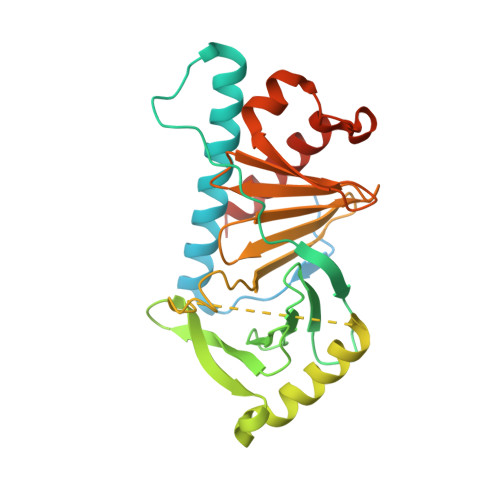Distinct surfaces on Cdc5/PLK Polo-box domain orchestrate combinatorial substrate recognition during cell division.
Almawi, A.W., Langlois-Lemay, L., Boulton, S., Rodriguez Gonzalez, J., Melacini, G., D'Amours, D., Guarne, A.(2020) Sci Rep 10: 3379-3379
- PubMed: 32099015
- DOI: https://doi.org/10.1038/s41598-020-60344-4
- Primary Citation of Related Structures:
6MF4, 6MF5, 6MF6 - PubMed Abstract:
Polo-like kinases (Plks) are key cell cycle regulators. They contain a kinase domain followed by a polo-box domain that recognizes phosphorylated substrates and enhances their phosphorylation. The regulatory subunit of the Dbf4-dependent kinase complex interacts with the polo-box domain of Cdc5 (the sole Plk in Saccharomyces cerevisiae) in a phosphorylation-independent manner. We have solved the crystal structures of the polo-box domain of Cdc5 on its own and in the presence of peptides derived from Dbf4 and a canonical phosphorylated substrate. The structure bound to the Dbf4-peptide reveals an additional density on the surface opposite to the phospho-peptide binding site that allowed us to propose a model for the interaction. We found that the two peptides can bind simultaneously and non-competitively to the polo-box domain in solution. Furthermore, point mutations on the surface opposite to the phosphopeptide binding site of the polo-box domain disrupt the interaction with the Dbf4 peptide in solution and cause an early anaphase arrest phenotype distinct from the mitotic exit defect typically observed in cdc5 mutants. Collectively, our data illustrates the importance of non-canonical interactions mediated by the polo-box domain and provide key mechanistic insights into the combinatorial recognition of substrates by Polo-like kinases.
Organizational Affiliation:
Department of Biochemistry and Biomedical Sciences, McMaster University, Hamilton, ON, Canada.















